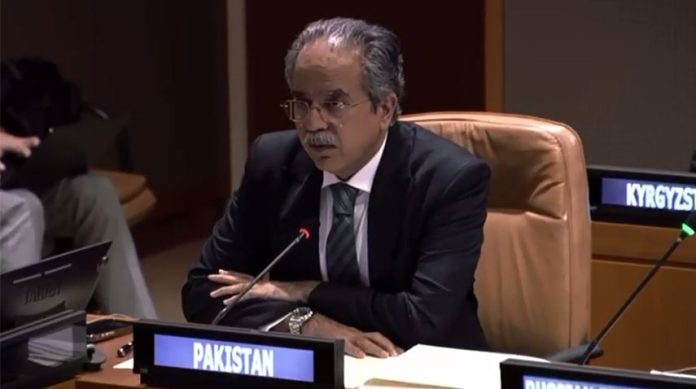Copyright thedailycpec

At the United Nations Headquarters in New York, Pakistan reaffirmed its steadfast adherence to the One China policy, emphasising that Taiwan is an inalienable part of the People’s Republic of China (PRC). The statement was made during a seminar marking the 80th anniversary of Taiwan’s recovery in 1945 and the upholding of UN General Assembly Resolution 2758. Addressing diplomats and scholars, Pakistan’s Permanent Representative to the UN, Ambassador Asim Iftikhar Ahmad, described China as an “ironclad friend and all-weather strategic cooperative partner.” He reiterated that Pakistan’s support for the One China Principle is based on historical legitimacy and a widely recognised international consensus. Commemorating a Historic Resolution The event, hosted by the Permanent Mission of China to the UN, revisited the adoption of UN Resolution 2758 on 25 October 1971. The resolution restored the PRC’s lawful rights within the United Nations and recognised its representatives as the sole legitimate representatives of China. Ambassador Asim recalled Pakistan’s crucial diplomatic role, led by Ambassador Agha Shahi, in ensuring China’s rightful restoration to the UN. He called the resolution a “seminal event” in multilateral diplomacy that reinforced dignity, sovereignty, and equality among nations. China’s Global Role and Visionary Leadership Ambassador Asim highlighted China’s responsible and constructive global role since its reinstatement to the UN. “Since its rightful return, China has played a commendable role in promoting peace, stability, and the purposes of the UN Charter,” he said. Praising President Xi Jinping’s leadership, he noted that China continues to tackle global challenges, from disrupted supply chains to geopolitical tensions, while promoting stability and cooperative development. Pakistan, he added, remains confident that peaceful reunification will be realised in line with the aspirations of the Chinese leadership and people. Historical Perspective from Pakistani Diplomacy Former Pakistan Ambassador to the UN Munir Akram shared his first-hand account of the 1971 events that led to the passage of Resolution 2758. Despite U.S. opposition, Pakistan, alongside Algeria and 21 other countries, mobilised international support to defeat a procedural motion aimed at delaying China’s restoration. “It became clear that the representatives of Chiang Kai-shek’s regime knew the game was over and left the Assembly hall,” Akram said, emphasising that the resolution “restored all the rights of the People’s Republic of China.” Global Reaffirmation of the One China Principle The seminar also featured statements from diplomats across regions, including Fu Cong, China’s Permanent Representative to the UN, who reaffirmed that “Taiwan is an inseparable part of China’s territory, an unshakable historical and legal fact.” He warned that any misrepresentation of Resolution 2758 distorts the post–World War II international order. Ambassadors from Algeria, Brazil, Nicaragua, and Cambodia also renewed their countries’ commitment to the One China Principle, describing it as the cornerstone of the UN system and international law. Strengthening Pak-China Partnership in Multilateral Forums Ambassador Asim Iftikhar underlined Pakistan’s appreciation for China’s leadership in revitalising multilateral diplomacy. He commended China’s global initiatives, such as the Global Development, Global Security, and Global Civilisation Initiatives, as key contributions to building a “Community with a Shared Future for Mankind.” He concluded by reaffirming Pakistan’s unwavering support: “China will always have Pakistan’s firm cooperation in the pursuit of global peace, stability, and shared prosperity.”



